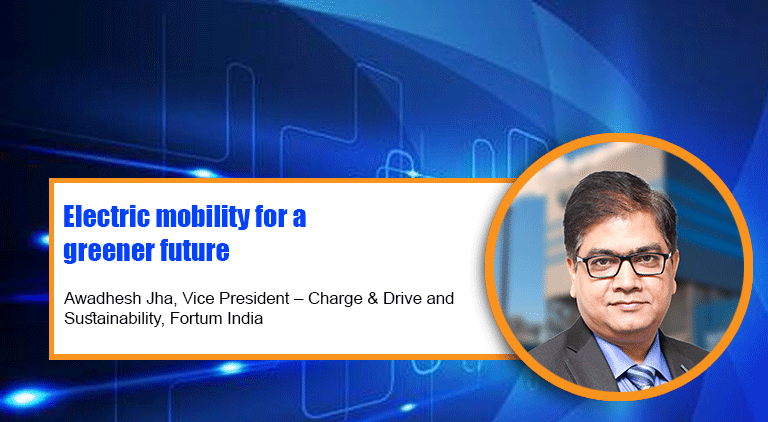Electric mobility for a greener future
By EPR Magazine Editorial April 7, 2020 4:45 pm IST
By EPR Magazine Editorial April 7, 2020 4:45 pm IST

Awadhesh Jha, Vice President – Charge & Drive and Sustainability, Fortum India, talks about the future of electric vehicles (EVs) in India and how the government is taking the right steps to develop the market on a wider basis.
What should be done to improve the EV market in India in terms of consumer acceptability, social infrastructure and product innovations?
In India, adoption of electric vehicles is at an early stage. For it to get adopted by the mass majority, we need a “push” by the government and a “pull” by customers. In India, the push has been provided by the government in the form of numerous initiatives like Faster Adoption and Manufacturing of Electrical vehicles (FAME); Electric Vehicle Policy by some of the state governments; Smart Cities Mission;Standardization of EV Chargers – Bharat Charger; the intent to replace the fleet of government vehicles with EVs; and accordingly separate EV tariff by the electricity regulator, bringing it under the lower bracket of GST, etc. over the period of the last couple of years.
Although under FAME-II the government has decided to set up about 2,500 electric vehicle charging stations in the country, it is not enough. To overcome range anxiety, consumers need assurance that their vehicles will get charged at their preferred location, time, and price. This requires a robust, ubiquitous, and user-friendly charging station network across country. As charging takes more time than gasoline fuelling, consumer would prefer charging stations in interesting places where they can spend time gainfully while their vehicles get charged. We need to add lakhs of charging points year on year, if all vehicles sold are electric in the future. This would require access to space, which is scarce in our country, particularly in urban areas. Augmented electricity infrastructure would be required at the local network level even though at the national level this will not be significant.
This is the area where the government needs to focus on making parking space available to competent and willing Charge Point Operators (CPO) and providing adequate electricity infrastructure at those locations.
From the consumer perspective, charging infrastructure should be smart and offered using the IoT platform. Consumers should have control on not only the amount of charging but also the charging time and location. Besides, as the vehicle is likely to take a reasonable amount of time for charging, the charging location/area should be such that people can spend their time meaningfully. Such locations can also work as a learning centre where pre-recorded learning materials like managing finance, managing life in a healthy way, etc. can be played while the vehicle gets charged.
How can the use of solar energy and other clean energy sources be increased so as to ensure that EVs have zero emissions, right from the source of energy?
As it can be seen from the above chart, coal-powered power plants are being phased out. So, the electric vehicles will increasingly be charged by cleaner and greener energy in the future.How do you think will the recycling of EV batteries pose a challenge for wide acceptance of EVs?
Since the adoption of EVs in India is still at a nascent stage, there is no authorised lithium battery recycling facility for used lithium-ion batteries generated from electric mobility. However, technologies are available for recycling of lithium-ion batteries to recover valuable metals like cobalt, nickel, lithium, copper and aluminium, and any proponent can install such a facility in the country. Fortum is offering this service in Europe through our own facility in Finland. Our low-CO2 solution makes over 80 percent of the battery recyclable, returns the scarce metals used back into circulation, and resolves the sustainability gap by reducing the need to mine nickel, cobalt, and other scarce metals.
I do not think that recycling of EV batteries poses any challenge to the wider adoption of EVs by consumers. A Li-ion battery has a long life before it becomes a candidate case for recycling. The life cycle of a battery starts with the so-called first life where a battery is used, for example, to power an electric vehicle or as a power storage. After a decade or more of use, a lithium-ion battery is no longer suitable for its original purpose. The battery often still retains enough capacity to serve in so-called second-life functions, such as stationary power storages in wind or solar power plants. After being in use for many years in stationary storage, only these batteries would require recycling or safe disposal. A prudent guess is that the need for mass-scale recycling of batteries in India would arise after 15-20 years. So, it cannot be considered as a hindrance for the adoption of EVs.
However, the government has already started taking steps in this direction and has come out with the Battery Waste Management Rules 2020 to create a framework for managing these battery wastes. This will enable a new business opportunity of recycling of lithium-ion batteries used in EVs.
Switching to EVs today can make a major impact in reducing carbon emissions and toxic air pollution.
We use cookies to personalize your experience. By continuing to visit this website you agree to our Terms & Conditions, Privacy Policy and Cookie Policy.